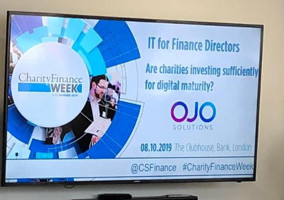We live in the age of information. An astonishing 2.5 quintillion bytes of data are created on the web every day – that’s the equivalent of 10 million Blu-Ray films every 24 hours. Yet despite all this data, we still often struggle to gain access to the information we sorely need to facilitate decision-making and work productively.
But the rise of AI and big data is transforming the way we see information and how we use data – opening the doors to data delivering real-time insight and providing a single truth.
A world in which it’s commonplace to view real-time fundraising figures and access financial performance and management accounts automatically, without human intervention, is within reach. Emerging technology has the potential to liberate us all and focus us on purposeful decision-making. This is the information age.
Knowing what to measure
The prevalent challenge for many professionals currently is the oversaturation of data. With so much at our fingertips, too much data can actually prevent change. Clarity of what you want to measure, how, and why, based around your core purpose, is an essential first step to take.
To put it in simple terms, consider the smartwatch. This incredible technology allows me, as a runner, to see my running pace, heart rate, stress levels and how well I am sleeping. But why is this all necessary, and what is the purpose of this data? Ultimately, while it’s useful for distance training, I need a combination of empirical data and internal knowledge to tackle long-distance running challenges.
Driving evidence-based decision making is no different. The information we need is both qualitative and quantitative – all of which is data that can be measured and used to help us build a complete picture.
Balancing curiosity with maturing digital relationships
Our relationship with data needs to mature with time; it’s unrealistic to transform from being digitally illiterate overnight. Change isn’t linear or easy; it requires a commitment to grow, and human beings are largely creatures of habit. But digital transformation can be achieved if the right organisational culture exists, with the skills, capability and leadership to embrace technology to the fullest.
Simply put, digital transformation is about understanding our relationship with – and use of – digital to support processes, people and organisations in meeting the expectations of stakeholders and customers in a digital age. It’s a deepened knowledge of how technology can enable us to do more and deliver greater impact. It’s a relationship.
And it’s a process. We need to pass through the curiosity stage, exploring, learning and continually experimenting. With technological advancement moving apace, we are engaging with and using technology at all points of the day and night and are increasingly reliant on it for navigating modern life. We all have to mature with the technology.
Accountability and positive change
As leaders, we need to be comfortable being uncomfortable. Change starts from within, and leaders must see digital as the responsibility of all, not just a select few specialists, and foster a culture of accountability. Business heads must also be digitally mature in order to use technology to support effective governance and leadership.
As leaders, we are accountable and ultimately accountability delivers results. But digital cuts across every aspect of every organisation, and therefore it is everyone’s responsibility to lead and drive digital agendas forward.
Like climate change, every change we make today has an impact tomorrow. Digital transformation is no different. For finance leaders, digital maturity should be viewed as an investment in the future – as when the right technology is in place, with clear accountability, positive change is possible to achieve. Yes, IT infrastructure does cost, but charities also have an opportunity to leverage sizeable discounts to make it much more affordable, irrespective of size.
Place energy where it matters most
Once you know the data that matters most to your organisation, and how to measure it, you can focus technology’s energy on where it is most needed.
At OJO, we’ve worked alongside a charity to help measure the amount of time spent dealing with employment relations issues in comparison to time invested in coaching and supporting. Having identified this through data, the internal focus shifted towards managing and guiding individuals.
Another charitable partner of ours used data to understand the un-met needs of people with terminal cancer and the missed opportunity to engage an ever-widening supporter and potential client base. Through the use of data, we identified that multiple engagement touchpoints weren’t being maximised – in the charity’s shops, online, and in the community – and the opportunity to clearly communicate the full breadth of services on offer.
It’s your digital story
If you are in the early stages, or considering, your digital transformation, we recommend that you start from a position of understanding the digital story you want to tell – using that digital purpose to drive forward-focused decisions.
Digital should support you in your strategic goals, but it is an enabler: it’s not the answer in and of itself. Data provides a single truth, so let the data tell the story.
Nathan Baranowski is managing director of OJO Solutions
This content has been supplied by a commercial partner. OJO Solutions was an associate sponsor at the Charity Technology Conference 2019.
|
Related items












